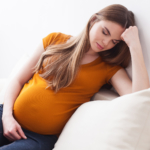Early pregnancy loss (EPL) is common, affecting up to 25% of pregnancies. Studies looking at the emotional consequences of miscarriage have shown that most women do well; however, some women experience clinically significant symptoms of depression and anxiety. In addition, at least one study has demonstrated that prior pregnancy loss is associated with higher levels of anxiety and depression in subsequent pregnancies. This was true regardless of the type of prior pregnancy loss (miscarriage or termination).
In a recent study, Farren and colleagues prospectively examined the type and severity of emotional symptoms women experienced after an early pregnancy loss (n = 128), as compared to women with viable ongoing pregnancies (n = 58). At one month, 28% of the women had symptoms suggestive of PTSD. At three months, even more women (38%) experienced PTSD symptoms.
At 3 months, the proportion of women with early pregnancy loss who displayed symptoms of anxiety and depression were 20% and 5%, respectively, a finding that is consistent with other studies. The new finding here is the high rates of PTSD symptoms.
Typically women who have an early pregnancy loss do not receive any specific medical or psychological follow up. The finding of high rates of PTSD suggest we have to offer more support to this group of women. This study did not look at the persistence of PTSD into subsequent pregnancies; however, my clinical impression is that women who have experienced a miscarriage continue to feel higher levels of anxiety and PTSD symptoms during subsequent pregnancies.
Obviously the emotional symptoms a women may experience after a pregnancy loss can affect her quality of life and her ability to function, but we also need to be aware of the long term effects of these experiences. Some but not all studies suggest that stress and anxiety experienced by the mother may decrease her ability to conceive. In addition, recent studies have demonstrated that women with PTSD symptoms during pregnancy have worse outcomes. In one study, infants born to mothers with PTSD had lower mean birth weights than infants born to mothers without PTSD. In addition, multiple studies have shown that women with PTSD are more likely to experience preterm birth.
The researchers conclude with these comments, “Exposure to EPL [early pregnancy loss] on a daily basis may lead clinicians to normalise the experience and overlook the possible profound psychological sequelae. The data presented are in the context of a pilot study; however, if our findings are supported by further large prospective studies, we believe that consideration should be given to screening all women who have suffered an EPL for PTSD.”
Ruta Nonacs, MD PhD
Farren J, Jalmbrant M, Ameye L, Joash K, Mitchell-Jones N, Tapp S, Timmerman D, Bourne T. Post-traumatic stress, anxiety and depression following miscarriage or ectopic pregnancy: a prospective cohort study. BMJ Open. 2016 Nov 2;6(11):10. Free Article
Read More:
Miscarriage and ectopic pregnancy may trigger post-traumatic stress disorder (EurekAlert!)
Miscarriage, ectopic pregnancy associated with PTSD (Healio)








Leave A Comment